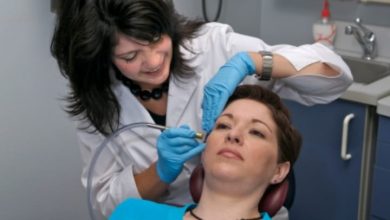How to become a Radiation Therapist
:
Radiation therapy is used to treat cancer as well as to relieve the symptoms of the disease. Internal and external beam radiation therapies are local treatments that target specific parts of the body to cure, prevent recurrence, and stop or delay cancer cell proliferation. Read on for a guide on how to become a radiation therapist.
Radiopharmaceuticals, brachytherapy, and systemic radiation therapy are examples of internal radiation therapy. Palliative radiation therapy is intended to reduce the intensity of symptoms such discomfort, difficulty breathing, and incontinence.
Radiation therapists are in charge of a variety of critical tasks. These medical professionals aid in the treatment of cancer and other diseases by administering radiation therapy to patients and explaining it to them; operating x-ray machines and other related medical equipment to ensure they are up to certain standards; monitoring the patient throughout the treatment; and recording the treatment’s results once it is completed.
Related Post:Easiest PA Schools to Get into
Radiation therapists may communicate with and report to radiation oncologists, oncology nurses, radiation physicists, and anyone else involved in the process of giving and monitoring radiation treatment because they are most typically part of an oncology team.
Radiation therapists, in the end, have important roles to play in helping patients improve their quality of life. Patients feel most at ease when they are informed and emotionally cared for, according to a study conducted by the National Center for Biotechnology Information. One of the ways patients gained this crucial emotional comfort throughout treatment was through their relationships with radiation therapists.
A Successful Radiation Therapist’s Skills and Characteristics
There is no one personality type that is best suited to work as a radiation therapist. Certain personality traits and skills, on the other hand, may aid a prospective radiation therapist in achieving their objectives. The following characteristics and skills are listed by O*NET (2020) as potentially relevant for someone interested in becoming a radiation therapist:
- Critical Thinking: Perhaps most essential, radiation therapists must be able to assess problems and devise rational ways and solutions based on the available resources.
- Because radiation therapists interact closely with patients receiving treatments, they must be able to check their comfort and satisfaction at all times.
- Radiation therapists must have a strong background in physics, mathematical principles, medicine and dentistry, as well as the types of ailments that are treated with radiation therapy.
- Operation Monitoring: To ensure the safety and success of radiation treatments, these therapists must be able to actively monitor them.
- English Language Skills: Radiation therapists must be able to communicate effectively in English with both patients and other medical professionals.
Responsibilities and Requirements
Those interested in a career in radiation treatment should be informed of licensing procedures as well as important role responsibilities.
To work as a radiation therapist in the United States, an individual must first complete a recognized degree in the discipline of radiation therapy or radiography. This includes meeting the American Registry of Radiologic Technologists’ (ARRT) Radiation Therapy Didactic and Clinical Competency Requirements in an accredited program.
Many four-year universities and colleges offer degrees that satisfy these requirements while yet allowing students to pursue other interests. As a result, many people choose for inclusive bachelor’s degrees. A radiation therapist, on the other hand, does not need to have a bachelor’s degree in radiation therapy or radiography; instead, persons interested in pursuing a career in radiation therapy can earn an associate’s degree from a recognized institution, which could be a community or technical college.
The Joint Review Committee on Education in Radiologic Technology (JRCERT) is the only accreditation agency for radiation therapy programs approved by the Council on Higher Education Accreditation and the US Department of Education.
After earning either an undergraduate or graduate degree in radiation therapy, a person must get certified by the American Registry of Radiologic Technologists (ARRT), the national licensing authority for radiation therapists.
Related Post:Liberal Arts Schools in Tulsa
To do so, the aspiring radiation therapist must apply for and pass an examination that will assess their knowledge in the area. The exam costs $200 for individuals taking it for the first time, and $175 for successive examinations. The fee of reinstatement by examination is also $200. To recertify the ARRT credential, some students must pay a $75 online reinstatement fee.
What is the average time it takes to become a radiation therapist?
The length of time it takes to become a certified radiation therapist depends on the educational path chosen. Completing a bachelor’s degree, gaining experience, becoming certified, and entering the field could take four to five years. Many people regard getting an associate degree and certification while working in a support function as an appealing option for aspiring radiation therapists who want to start working in less than three years.
Become a Radiation Therapist: A Step-by-Step Guide
High School Graduation
Radiation therapists must first graduate from high school or acquire a GED. Almost all two- and four-year schools and universities have this requirement. High school students interested in radiation treatment should also take biology, physics, chemistry, and mathematics classes, not just to understand the topic but also to have experience managing a large course load. Volunteering in a hospital radiation therapy department may be an option for such students, as observation hours may be required for entrance to undergraduate programs in the subject.
Obtain clinical knowledge
In order to receive a diploma, students must satisfy certain clinical criteria during the course of their radiation therapy degree. This could include working in a clinical environment with a qualified radiation therapist for 15 credit hours or more.
Additionally, students should seek out employment in the field of radiation therapy, as this will offer them with a broader knowledge base and opportunity to acquire the skill set necessary to qualify for future employment prospects.
Related Post:Law Enforcement Colleges
Obtain ARRT certification.
The ARRT (American Registry of Radiologic Technologists) offers a radiation therapy credential (T).
Following graduation, an individual can register with ARRT to take an examination, which must be passed in order to become a qualified radiation therapist. Although the exam is only one day long, students must first submit an application and money, as well as prepare for it, which could take months. Candidates have three years from the conclusion of their educational prerequisites to apply for ARRT certification, and they are allowed three attempts at the exam during that time.
Look for a job or continue your education.
Finally, individuals with at least an associate degree can work as radiation therapists or, with more extensive training, as dosimetrists, after they are certified. Radiation specialists are used in a variety of settings, including hospitals, cancer clinics, and educational institutions. In order to explore chances in teaching, technical sales, research, or management, therapists may pursue further specialization in a subfield, supporting discipline, or related field, depending on their professional goals.
Is it Difficult to Work as a Radiation Therapist?
Radiation therapy, like any other medical profession, may be difficult. However, most of the difficulties may be overcome with education and experience. Let’s go over some of the difficulties you can face as you begin your career.
Requirements for Education
Radiation therapy necessitates a unique set of skills. The use of ionizing radiation treatment to your patients will be your primary responsibility. You must understand how to prepare the proper treatment dosage, how to properly position patients, and how to track therapy success.
Radiation therapy also necessitates a thorough understanding of human anatomy and how the body responds to radiation. The subject matter can be difficult to grasp at first, particularly for those who are new to the medical industry.
Emotional Stress: As a radiation therapist, you’ll be able to provide emotional support to cancer patients. While this is a gratifying component of the job, it can also be an emotionally draining experience. Emotional stress can be caused by difficult diagnosis and even patient loss.
You’ll be able to get your first entry-level radiation therapy job after graduation. As you acclimatize to being in the field and working in a new setting, you’ll encounter a learning curve.
FAQs
What is the role of a Radiation Therapist?
A Radiation Therapist’s professional responsibilities include, but are not limited to:
- Simulations of radiation therapy are carried out (setting the patient up for daily treatments)
- Providing radiation treatments on a daily basis
- Equipment for delivering treatment is being evaluated and monitored.
- Calculating the dose of radiation
- As a member of the medical team, you’ll be working under supervision.
- Providing excellent patient care
- Collaboration with physicians and other healthcare professionals.
- Radiation therapists must be able to communicate with people of all ages, from healthy to terminally ill, in a sympathetic and effective manner.
What steps do I need to take to become a radiation therapist?
During the fourth year of the Radiologic Sciences bachelor’s degree program, the Radiation Therapy Specialization is offered. After completing the Radiation Therapy curriculum, the student will be prepared to take the American Register of Radiologic Technologists’ national registry examination in Radiation Therapy.
What is the Radiation Therapy Specifications eligibility?
Individuals must be certified radiologic technologists in order to work in this field. Candidates who have completed all of the core curriculum and senior institution prerequisites are preferred.
What do a Radiation Therapist’s technical skills entail?
Radiation therapists should be able to do the following:
- Lifting more than 50 pounds on a regular basis
- Push and pull on a regular basis.
- Bend and stoop on a regular basis.
- Use all hands, wrists, and shoulders to their utmost potential.
- Distinguish between audible and non-audible sounds.
- They work while on their feet. Assist patients on and off treatment tables, trolleys, and in and out of wheelchairs 90% of the time
- Effectively communicate with patients, their families, and other health-care providers.
- Organize and correctly complete each step of a radiation therapy operation in the correct order.
What Kinds of Jobs Are Available for Radiation Therapists?
Radiation therapists might work in hospitals, medical clinics, or for industry-related technical companies. As education/application specialists, sales representatives, technical advisers, and other positions in education, administration, research, and commercial organizations, there are prospects for progress. The therapist can also pursue a career in medical dosimetry, a branch of radiation therapy that focuses on treatment planning and dose calculations. Radiation therapists’ incomes are competitive with or higher than those of other professionals with similar levels of education, in addition to outstanding career options.
Are there any additional costs for a Radiation Therapist Student?
The cost of textbooks and lab coats, in addition to university tuition, is roughly $500. The cost of life varies from person to person.
For the spring and summer semesters, a computer, scanner, and high-speed Internet are necessary.





